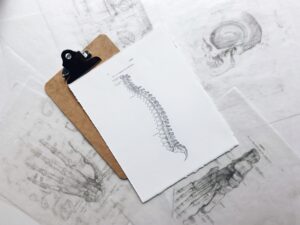Updated: Mar 4, 2025
If you have neck pain and nausea, the chances are that they are associated. Most neck pain is associated with the cervical spine, which plays a critical role in supporting the spinal cord and overall nervous system function. There are several conditions that can cause you to suffer from both nausea and neck pain. Identifying the root cause is essential for finding the right treatment options to relieve these symptoms.
Understanding Neck Pain and Nausea
What is Neck Pain?
Neck pain, also known as cervicalgia, is a common issue that can range from a mild discomfort to severe, debilitating pain. It can be either acute, lasting for a short period, or chronic, persisting for weeks or even months. Various factors can contribute to neck pain, including poor posture, sleeping in an awkward position, injuries such as whiplash, muscle strain, nerve compression, infections, and trauma. In some instances, neck pain might be a symptom of a more serious health condition, such as a traumatic injury or even a stroke. Maintaining good posture and taking preventive measures can help mitigate the risk of developing neck pain.
The Connection Between Neck Pain and Nausea
Neck pain and nausea are often interconnected due to the close relationship between the neck and the brain. The cervical spine, located in the neck, plays a crucial role in protecting the spinal cord, which houses numerous nerve endings that transmit signals from the brain to the rest of the body. When the neck is strained or injured, it can lead to nausea and other symptoms like dizziness, headaches, and fatigue. Additionally, neck pain can sometimes cause nausea by compressing the vagus nerve, which extends from the brain to the abdomen and is vital in regulating digestion. Understanding this connection can help in identifying the root cause of these symptoms and seeking appropriate treatment.
Conditions That Can Cause Neck Pain and Nausea
When your neck hurts, it can be due to a variety of factors, ranging from poor posture to serious health conditions. There are several conditions that will present with these symptoms. These conditions include:
- Vestibular conditions. Things like Meniere’s disease and other vestibular conditions can cause both neck pain and nausea. The vestibular system controls your balance, and when that system is off, it can make you feel dizzy and queasy. • Neurological conditions. Fibromyalgia, migraines, and other nerve conditions can cause both of the symptoms. Neck pain and nausea are two very common migraine symptoms. At least 75% of migraine sufferers will experience neck pain and nausea.
- Cervical radiculopathy. This condition occurs when a nerve in the cervical spine becomes compressed, leading to shooting pains, numbness, tingling, and other symptoms, including nausea.
- Cyclic vomiting syndrome. Though uncommon, this disorder affects the central nervous system and may be associated with neck pain due to nerve compression and inflammation.
- Cervicogenic dizziness. This type of dizziness originates from the cervical spine and is often linked to poor posture, spinal misalignment, or muscle tension in the neck muscles.
The Role of the Cervical Spine and Spinal Cord in Neck Pain
Cervical Spine Instability and Nausea
The cervical spine is a complex structure composed of seven vertebrae, intervertebral discs, and supporting ligaments. When this structure becomes unstable, it can lead to neck pain and nausea. Cervical spine instability can arise from various factors, including injuries, degenerative conditions, and poor posture. This instability can exert pressure on the spinal cord and surrounding nerves, resulting in symptoms such as neck pain, nausea, and even dizziness. In some cases, cervical spine instability can also lead to cervical vertigo, a condition that affects balance and equilibrium. Addressing the underlying causes of cervical spine instability through physical therapy, posture correction, and other treatments can help alleviate these symptoms and improve overall neck health.
Cervical Spine
The cervical spine consists of seven vertebrae that support the head and allow for a wide range of motion. Issues such as misalignment, herniated discs, and nerve compression in this area can contribute to neck pain and related symptoms.
Spinal Cord
The spinal cord runs through the cervical spine and serves as the main communication pathway between the brain and the body. Damage or compression of the spinal cord in the neck region can lead to neurological symptoms, including pain, tingling, and nausea.
Neck Stiffness
A stiff neck can result from muscle tension, poor posture, or underlying medical conditions. Stiffness in the neck muscles can limit movement, contribute to discomfort, and may be associated with dizziness and nausea.
Preventing Neck Pain
One of the best ways to ensure that you do not have neck pain is to keep your neck healthy.
Keeping your neck healthy is easy if you do the following:
• Exercise. Exercise will help to ensure that your neck is healthy. Exercising will help you to maintain your body weight. When you are too heavy, it can put a strain on your spine, and that includes your neck. When you exercise, you are also strengthening your core and other muscles. Having strong muscles can help to prevent neck pain.
• Posture. When you have poor posture, it can result in misalignment of the spine. You can also deal with repetitive motion injuries and increased stress on the spine and neck. You should pay close attention to your posture when you are working at a desk, driving, or using your mobile device. When you look down to view your smart device, you are putting five times the weight on your neck than when you sit with proper posture. Make sure that you work on your posture throughout the day.
• Nutrition. Nutrition is imperative in preventing neck pain. Having proper nutrition will help you have a healthy body weight. Eating foods that have anti-inflammatory properties are excellent for your health and can help you to avoid neck pain and nausea.
How To Treat Neck Pain
If you already suffer from neck pain, there are several all-natural ways that you can help to alleviate that pain.
• Massage. Massage can help to encourage healing by improving blood flow.
• Activity. When you have neck pain, you may want to sit or lay down until the pain has passed. Living a sedentary lifestyle can actually make the pain worse. Small exercises like walking or stretching can help to alleviate pain.
• Ice. When you are in pain, you will have inflammation. Ice is great at reducing inflammation. Make sure that you protect your skin and place ice on your neck several times a day.
• Heat. Using a heating pad can help to relax muscles that are tight. This can help to minimize your pain and reduce inflammation. You can get the most benefits by alternating between heat and ice.
Medical Attention
If your neck pain is severe or accompanied by symptoms like unexplained weight loss, numbness, or nerve damage, seek medical attention promptly. A doctor may recommend imaging tests like a CT scan to identify disc herniation, vertebrae misalignment, or other structural issues causing nerve compression.
Neck pain can stem from various conditions, including pinched nerves, disc herniation, and joint inflammation. The human body relies on the spinal column to send signals to different areas, and any disruption can result in many symptoms. Certain neck conditions may compress nerves, leading to discomfort, mobility issues, and even unexplained weight loss. Applying an ice pack, engaging in regular exercise, and seeking medical attention when necessary can help manage symptoms effectively. A CT scan may be recommended to diagnose underlying issues and ensure appropriate treatment. Health Direct resources can also provide guidance on managing neck injuries and related concerns.
When To See a Chiropractor
If you experience persistent neck pain, stiffness, or other symptoms like dizziness, nausea, or a severe headache, consulting a chiropractor may be beneficial. A chiropractor can assess your medical history, conduct an accurate diagnosis, and recommend a treatment plan tailored to your condition.
Chiropractic Care and Adjustments
- Spinal realignment can help address certain neck problems, including cervical spine injury and misalignment.
- Lifestyle modifications such as ergonomic changes and posture correction can prevent future pain.
- Supplemental therapies like muscle relaxants or acupuncture may be recommended in conjunction with adjustments.
Regular chiropractic visits can help maintain spinal health, particularly for those with chronic neck conditions, sports injuries, or degenerative disorders.
Making An Appointment With A Chiropractor
One of the best things that you can do if you suffer from neck pain and nausea is to make an appointment with a chiropractor. A chiropractor can help to determine the cause of your neck pain. For example, if your neck is misaligned, you will need to get it realigned. No matter how much self-care treatment you do, the pain will still be there because your spine is not aligned correctly.
At your first appointment for neck pain, you will be given an exam, and you will get some x-rays. The chiropractor will look to find the problem of your neck pain. If your neck is out of alignment, they will do adjustments to correct the problem. If the problem is severe, several adjustments may need to be done to help cure the neck pain. The chiropractor will also work with you to make lifestyle changes, postural correction, supplement taking, and more.
It is a good idea to keep going to the chiropractor regularly, even after your neck pain has subsided. This is especially true if the root cause of your pain is something like migraines. They can help to ensure that your health is where it should be and that you have no further issues with any kind of pain.
Contact Integrative Chiropractic Center
If you need a chiropractor in the Birmingham, Alabama area, please call Integrative Chiropractic Center today. They specialize in treating neck pain, spinal conditions, whiplash, and other injuries. Their expert team can help with nerve-related conditions, pain relief, and posture correction.
Their friendly staff will make you an appointment and get you in quickly to help alleviate all of your neck pain. Call us at 205-637-1363.








